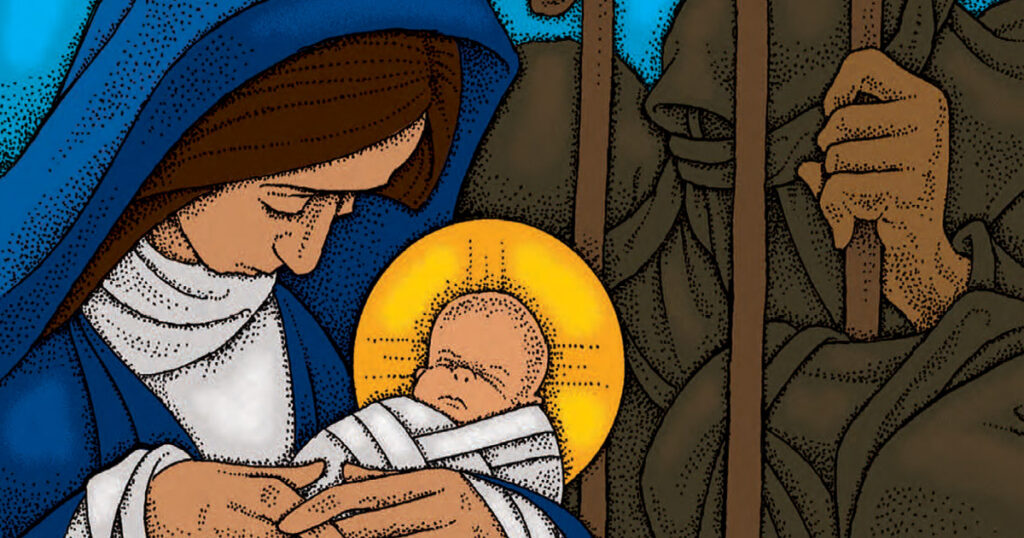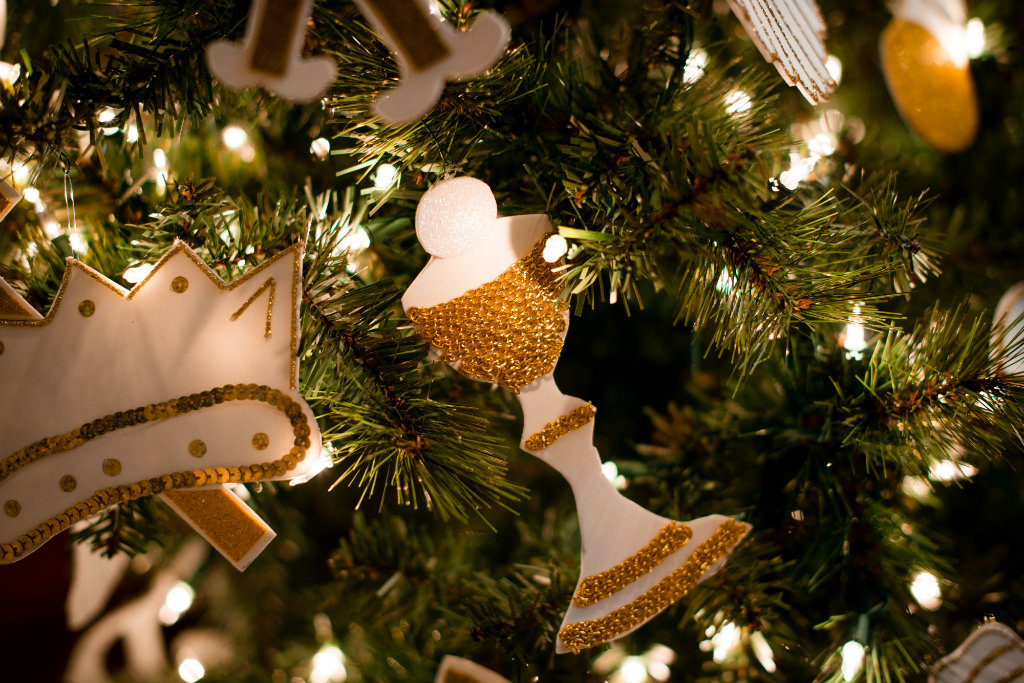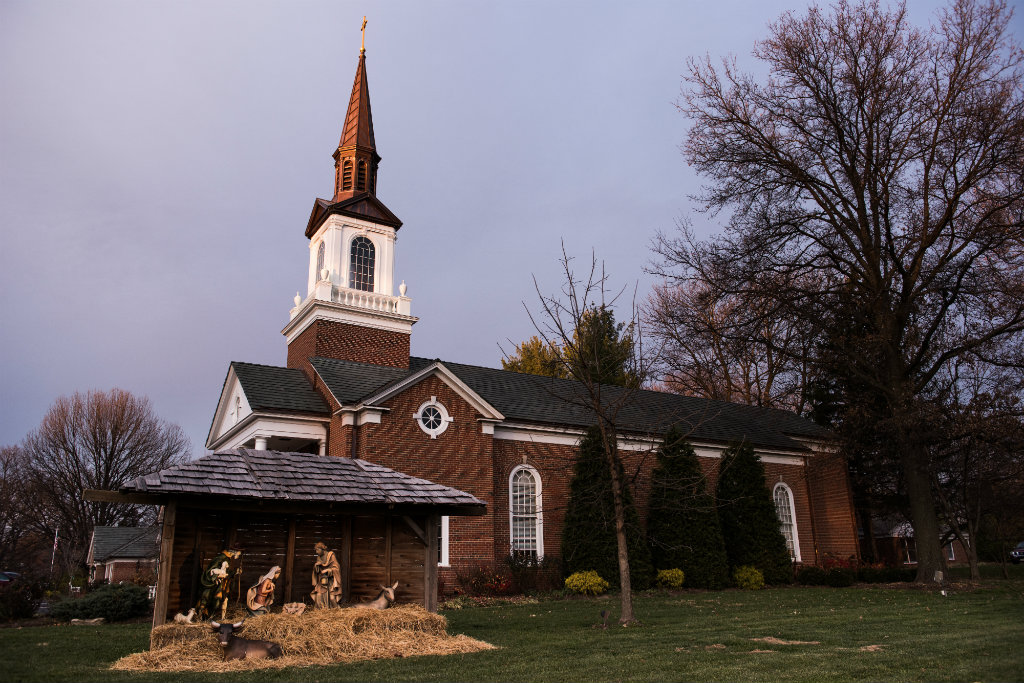by Merritt Demski
The theology of the Incarnation has ruined Christmas for me. It sounds weird, right? Jesus is the “reason for the season,” so how could any discussion that involves Him ruin Christmas?
Perhaps I should clarify: The theology of Jesus’ incarnation has ruined “cultural” Christmas for me. Now, I’m not saying here that trimming a tree isn’t fun or that the Bing Crosby Christmas music playing in stores doesn’t ever inspire warm and fuzzy feelings, but these things just don’t seem as important or meaningful to me as they once did. Family and cultural traditions are enjoyable and worthwhile, sure, but once I began to wrap my head around the theology of the Incarnation, all the fluff surrounding our cultural celebration of Christmas simply took a back seat.
When we talk about “the Incarnation,” we’re talking about the birth of Jesus. We’re talking about God taking on human flesh. (The Latin root word incarnare literally means “to make flesh.”) The Incarnation is discussed in each of the Gospels, but John opens his Gospel with what is perhaps the most jaw-dropping presentation of who Jesus is, from “In the beginning was the Word” (John 1:1) to “No one has ever seen God; the only God, who is at the Father’s side, he has made him known” (John 1:18). If you’ve read the other Gospels and come away with any questions regarding the identity of Jesus of Nazareth or the purpose of Holy Scripture, read John. He clears things right up from the very start. Not only is Jesus a man from Nazareth, but He’s also the Son of God. Remember when God created everything in the beginning? Jesus was there. He IS the very Word through which all things were and are created. And now, in the Incarnation, He comes to save His creation.
Reminders of the Incarnation are all around us at this time of year, but how often do they put us in a fitting state of wonder and awe? I see plastic nativities depicting the event of Jesus’ birth and note only how well or cheaply they’re put together. I see the doll carried up the aisle by the children in the Christmas service at church and wonder only if this is its fourth or fifth decade of pageant service. Rarely do I stop to process what the plastic creche and the well-worn doll really signify — what is really being said by these simple objects.
But then, for a brief, fleeting moment, it clicks: In Christ, the God of all creation took on the flesh of His creation. That God is at the same time Father, Son and Holy Spirit. God is three persons, and yet there is only one God. Christ is both true God and true man. Suddenly the Bing Crosby music fades away and I’m struck by the awe of God’s “enfleshment” … His taking on flesh … His Incarnation. I sit back and celebrate with every fiber of my being the arrival of the King of kings and Lord of lords. I recognize the truth that Christians gather together — on Christmas and every Sunday — not simply for the sake of cultural tradition, but to praise the One who was announced by angels. Glory to God in the highest!
This earth-shaking realization can leave me feeling a little underwhelmed by the ways in which we typically respond to the angels’ “good news of great joy.”
“The King of kings and Lord of lords has arrived! Quick, bake gingerbread cookies shaped like little men! Put out the snow globe lawn ornaments! Hang an odd sock for a red-suited man who grants all our wishes — if we’re not too naughty!” How much less cosmically awe-inspiring are these things than the event they purportedly celebrate? How often do they serve not to ornament our celebration of Christ’s birth but distract us from it? The second Person of the Trinity deliberately became man for us. The Son who appeared to people throughout all of Holy Scripture came in the flesh. He laid His glory aside to serve you and me. To live. To suffer. To die. To rise again in glory. To give us life.
In Acts 20:28, Paul shares some words of encouragement as he is getting ready to leave the elders in Ephesus: “Pay careful attention to yourselves and to all the flock, in which the Holy Spirit has made you overseers, to care for the church of God, which he obtained with his own blood” (emphasis mine).
Take a moment to re-read that. Paul has just told the elders of Christ’s Church in Ephesus to watch over the flock, God’s Church, “which he obtained with his own blood.” Sure, we remember the birth of Jesus, but do we remember that He was 100 percent man and 100 percent God? Do we remember that He felt the beatings? That He felt the spit? That He heard the curses and felt the nails?
God loves us so much that He sent His Son, who was, as we confess in the Nicene Creed, “begotten of His Father before all worlds, God of God, Light of Light, very God of very God, begotten, not made, being of one substance with the Father, by whom all things were made.” In that tiny baby, “the whole fullness of deity dwells bodily” (Col. 2:9) — for our sakes.
The Baby in the manger is the perfect One who redeems us in our imperfection. Immanuel, “God with us,” is still with us, not just at Christmas but always through His Word and Sacraments. The same body that went to the cross is now resurrected in glory at the right hand of the Father and given to us at His table each week.
God is not out there hiding from us. He’s here. With us. In the flesh.
Part of me is sorry if you read this and find suddenly that the gingerbread man you’re chewing tastes a little less jolly or that the inflatable Santa in your front yard looks a little less fun, but part of me isn’t. You can celebrate cultural Christmas with family and friends — enjoy the time you share with them! — yet even so, I hope and pray that the glorious theology of the Incarnation ruins Christmas for you as it has for me. And I can’t feel sorry about that.
Far from it: I pray that every day of our lives in Christ would be so ruined.
The Rev. Merritt Demski is associate pastor of Immanuel Lutheran Church in Waterloo, Ill., and a regular guest on KFUO Radio’s Concord Matters.







I agree whole heartedly with this, because I’m trying to find a balance between cultural and spiritual Christmas.The cultural part ruins my peace of mind every season!
Thank you for this!